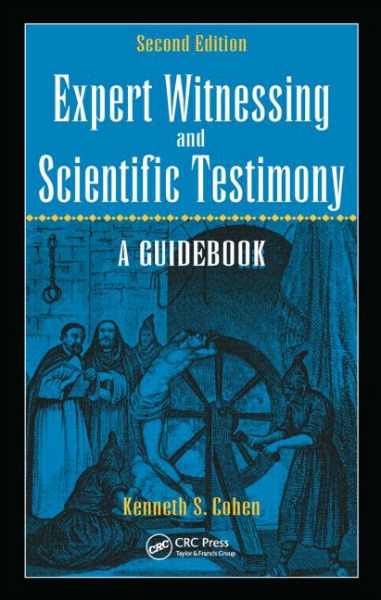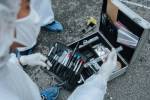The Forensic Expert Witness
Forensic experts can be employed by a variety of entities, such as federal, state or local laboratories or academic institutions. They may be called on to be expert witnesses or hired as consultants to contribute specialized knowledge and advice on scientific or technical issues. The Forensic expert witness may be subpoenaed or appointed by the court to assist the judge or jury in a criminal or civil case, to help an indigent criminal defendant, or to provide a third opinion on information and evidence previously reviewed by the prosecution and defense experts.
Want To Study Forensics/CSI?
Regardless of how or why expert witnesses are called to testify, they must be prepared. They must test evidence or gather technical information related to the case. When testing evidence, they must follow standard lab protocols and procedures. They must proceed step-by-step, in an orderly and logical way, to obtain the test results, facts and information on which conclusions are based.
After gathering information, the forensic expert witness must develop that information into effective reports that are written in plain English, reflect use of the scientific method and include valid documentation. Expert witnesses and the attorneys or courts who request them must work together to stay focused on the most important issues in the case and to help each other understand technical and legal terms.
|
Being prepared and organized helps expert witnesses add a sense of professionalism to their testimony. It also helps during the crucial — and sometimes laborious — pretrial discovery process undertaken by opposing attorneys to learn the underlying facts surrounding a matter in dispute. Discovery involves providing requested information to members of the opposing side that may help them prove their case. It is structured and driven by deadlines imposed by the court or by procedural rules. |
|
Tips For The Forensic Expert Witness Testifying in Court
The forensic expert witness must convince the judge or jury that their testimony is sound and truthful. They must be highly knowledgeable, organized, alert, unflappable and ethical:
Knowledgeable - Show that you are up to date, have command of the subject matter in your field, and are knowledgeable about the Federal Rules of Evidence and any state or jurisdictional laws relevant to the case. Know how to use such things as demonstrative evidence (an item not from the crime scene that is used to illustrate a point).
Organized — Be able to easily reference and locate key pieces of evidence. Reports should always be updated to include results of retesting, further testing of previous evidence or testing of new evidence.
Alert — Answer questions promptly and intelligently. How you respond could affect your credibility. Recognize the unauthorized appearance of evidence denied through motion in limine (a pretrial motion that bans evidence from trial for various prejudicial, irrelevancy or constitutional reasons).
Unflappable — Do not appear combative or annoyed during questioning, especially during cross-examination (questioning by the opposing attorney).
Ethical — Know the ethical standards of conduct. Do not be persuaded into presenting false testimony. Display objectivity, not advocacy.
(Information by Doris Wells, a writer and editor at the National Institute of Justice.)
Free Online Training For The Forensic Expert Witness
Law 101: Legal Guide for the Forensic Expert.
This National Institute of Justice course provides 13 modules and this introduction which is designed to give a comprehensive discussion of recommended practices for the forensic expert to follow when preparing for and testifying in court.
Because laws may vary from jurisdiction to jurisdiction, experts are advised to check with local attorney(s) and become familiar with the laws applicable in the court where they will testify.
Course modules include:
- Sources of Scientific Evidence.
- Report Writing and Supporting Documentation.
- Importance of Case Preparation.
- Subpoenas vs. Promises to Appear.
- Affidavits.
- Being a Court-Appointed Expert.
- Discovery.
- General Testifying Tips.
- Depositions.
- Pretrial.
- Trial.
- Post-Trial, Pre-Sentencing.
- Ethics for Experts.
You can access this excellent free online training course HERE.
Essential Reading
Based on the author’s more than 35 years of experience as a successful expert witness, this revised and expanded edition of Expert Witnessing and Scientific Testimony: A Guidebook demonstrates how to properly present scientific, criminal, and forensic testimony and survive the onslaught of cross-examination in court. It presents material in a step-by-step format for scientists or business professionals who find themselves thrown into the situation of testifying in a legal action.
Features:
- Includes two new chapters on fraud and medical malpractice testimony.
- Covers necessary legal protocols such as rules of evidence and procedure.
- Introduces the use of scientific literature, presentation of testimony, and the language of lawyers.
- Illustrates the courtroom experience with actual cases and experiences.
- Includes an extensive glossary of legal terms, detailed footnotes, and useful appendices summarizing code of conduct, paperwork, and examples of case reports.
The book addresses the courtroom experience by illustrating actual cases and experiences in procedure, strategy, cross-examination, and the exposure of personal history. It stresses that the primary role of an expert witness is to clarify and simplify complex technical, scientific, criminal, or forensic issues. Examples of experts with years of experience as witnesses highlight what to do and what not to do in providing quality testimony.
Expert Witnessing and Scientific Testimony: A Guidebook, Second Edition is an excellent aid for preparing to give expert testimony. Its real-life examples and practical suggestions to avoid common pitfalls ease your path to testifying in the courtroom. It is a valuable resource in warding off the stresses that accompany a high-pressure and high-value legal situation.
See following link for full details.
Expert Witnessing and Scientific Testimony: A Guidebook
Recent Articles
-
All About Forensic Science
Nov 12, 24 03:05 AM
A forensic science website designed to help anybody looking for detailed information and resources. -
The Role of Forensic Evidence in Criminal Defense Cases
Sep 05, 24 03:38 AM
Article exploring five key roles that forensic evidence plays in criminal defense cases -
The Evolving Role of Medical Science in Forensic Investigations
Aug 06, 24 03:35 AM
Insightful article exploring the critical role of medical science in forensic investigations.



New! Comments
Have your say about what you just read! Leave me a comment in the box below.